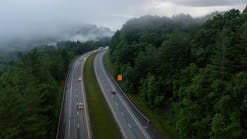Nov. 22, 2002 -- New sites of archaeological interest and a previously unknown prehistoric settlement have been recorded in North Leicestershire thanks to Severn Trent Water and UK engineering and architectural practice Pick Everard.
Leicester University archaeologists were, as usual, asked by the water company and its engineers Pick Everard to investigate the route of a 2.8km pipeline, for sewage flow from Rothley to Wanlip Sewage Works. Part of a scheme costing more than £1million, the pipeline crosses part of the county already known to have archaeological potential. Archaeologists unearthed further significant Neolithic, Roman and Saxon remains during the seven-week dig this summer.
John Thomas, of University of Leicester Archaeological Services (ULAS), who produced a report on the findings, said: "The remains are very significant and have expanded our knowledge of archaeological activity in the area as well as uncovering several new sites. There appears to have been an extensive settlement in the area over a long period of time and this is an area that had particular potential. We're very grateful to Severn Trent and the engineers for this opportunity."
The route of the new pipeline, due to be finished during November, was also altered to avoid a badger set. Pick Everard Associate Ron Ashton, a civil engineer and project manager said the Leicester-based company had worked for Severn Trent on many similar contracts: "We've often found ourselves in this role, caring for the environment. Before we start a scheme like this we always consult the various parties, which sometimes can be as many as thirty. We hardly ever find anything in spite of the investigations, so as we knew this site was potentially interesting, it's very exciting that remains have actually been found, and that they are so significant."
Before archaeologists could begin, the topsoil in the area was stripped away and a 1.8metre wide trench excavated through the subsoil to highlight the presence of any remains. Severn Trent engineer Mike Lowe, responsible for the project, explained: "It's our company policy to work with other environmental consultants on a job like this one and we consulted our archaeological expert, Keith Challis of Nottingham University Consultants. We allowed archaeologists in to complete their investigations before pipe laying started."
More research needs to be carried out into remains found but the report shows that the prehistoric settlement probably had an early ditched field system and pottery fragments retrieved indicated a Late Bronze Age or Early Iron Age date. Elsewhere Anglo Saxon and Roman remains were also recovered.


